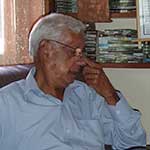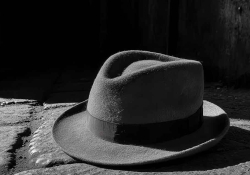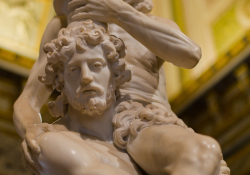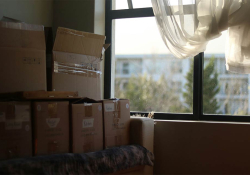Blood-Red Sweat (an excerpt)

In this excerpt from the forthcoming translation of the seminal Mauritian Hindi novel Lal Pasina, villagers on a small sugar plantation in the nineteenth century begin to wonder if their lives can’t change, and the novel traces the growth of this labor consciousness.
Pushpa and Kissan were talking about the last cyclone: six months after the epidemic decimated the community, another disaster. It was the beginning of a new month. They all remembered the storm’s approach: the red sky, the intense wind blowing harder and harder. In the dead of night, it began to rain heavily. The wind roared; lightning streaked the sky. The villagers huddled in their houses and chanted verses of the Chalisa, trembling in fear.
It was the third time, recently, they’d been faced with such adversity. Three months before the epidemic, a comet in the sky had sparked panic. The elders thought that it presaged disaster, the young ones were won over by their fear, and for the seven hours the comet made its passage through the sky, they all kept their doors and windows closed.
Pushpa returned to the cyclone, for on that terrible night, her friendship with Kissan was born. The wind had been a menace: the trees swayed, the walls of the houses were pliant, the roofs flew to pieces.
Pushpa and her mother had been upset. The roof of their house had blown away and they’d wandered, distraught, in search of shelter. Kissan had just seen them in a flash of lightning when a big branch cracked and fell from a banyan tree just above Pushpa. He sprang forward and pushed her to the side. They rolled around on the ground strewn with leaves.
The cyclone raged; the young men spent the night at Jatan’s. Kissan was so afraid, his emotional nature deeply shaken by what had happened with the comet and now with the storm. Yet he hadn’t hesitated to jump to save Pushpa. A sort of supernatural valiance came over him at the sight of her.
Once the cyclone calmed down, he was one of the first to start repairing his home. Pushpa wanted to make things up to him somehow, but Kissan would not hear of thanks.
A few days after the cyclone, Kissan was spending the evening on the riverbank, trying to write down the words to a song. Pushpa came upon him, a bundle of dry cloth under her arm. She was the village laundress for the day, washing the clothes in the river and laying them on the banks to dry. She had just picked up the dried clothes.
The evening was peaceful. Through the bare branches of the trees, stripped by the blast of the storm, they could see the last rays of the sun on the mountain. To the west, the horizon had spread its color over the sea, a hue as deep and somber as the sea itself. Kissan knew it to be the blue of the sea at low tide. He wanted to go to it, but it was not easy to get away from here. Pushpa came and sat behind him.
An idle birdsong echoed sadly in the leafless trees. The birds looked as though they were crying for their destroyed nests and broken eggs. The village’s roofs had been torn, and two people had died in the hurricane. But Kissan turned from those memories to his friend and as he saw her smile, he left the plaintive song of the birds far behind.
How had the foreman’s daughter got wind of their meeting on the banks of the river? The next day, she came to Kissan and reproached him, overwhelming him with embarrassing questions. He lied several times, then regretted it. Why should he fear Satya’s wrath?
At the end of her journey, Pushpa had found him on the banks of the river, still and pensive.
“Do you sleep here?” she asked, shaking him softly.
Kissan had truly been dreaming. He had almost fallen asleep and was startled when Pushpa’s hand touched his shoulder. They laughed. Sitting on the bank, Pushpa, feet in the water, folded the leaves into the shapes of birds. The last rays of the sun bathed everything in a golden light, and nothing could be heard but the lapping of the water.
Sitting on the bank, Pushpa, feet in the water, folded the leaves into the shapes of birds.
Kissan read his friend the first words of the song he had just written:
The bird flies away,
its nest destroyed.
He has gone to seek
refuge elsewhere . . .
Pushpa hummed Kissan’s songs all the time, their familiar melodies keeping her company, so she never felt alone. Kissan rose and held his hands out to Pushpa, helping her up. They walked even further from the village and awoke some of the forest as they did. Two hares fled at their approach.
The path skirted the edge of the woods, bordered on one side by trees and bushes, on the other by a cane field. The cane had been cut. The pair walked in silence together. There were always hundreds of things to talk about, but once they were together, they could not find the words and were silent. Pushpa started to speak at last: “Mama has been speaking of India again.”
“It’s useless to think about it.”
“Oh . . . it’s a comfort.”
“I would say that it makes you grieve more.”
“There’s something I don’t understand, though.”
“What’s that?”
Pushpa didn’t respond immediately; she waited until they had crossed the cane fields. “Mama says that the temples there were so high that when you looked to see the top of them, your hat would fall off.”
“So?”
“So: how could we be so poor in a country that had the means to build such temples? Were our parents pushed out?”
“They weren’t the people with the means or the power, that’s all.”
“You’re describing what it’s like over here. Are we oppressed all over the world?”
“Let’s talk about something else, if you don’t mind.”
“Mama said that my grandfather had seven cows.” Pushpa was silent for a long moment, then continued, “How I would love a cow of my own.”
“We don’t have any money, and we’re always at work.”
“You’re right, Kissan . . . but if we only had a cow, I would find grass for it to eat.”
“Come down from the clouds, darling.” A gust of wind took the wrap off Pushpa’s shoulders; she ran to catch hold of it and Kissan followed her, still holding her hand. Kissan caught it. “If the wind wants your orni, it’ll have to try a bit harder.”
Pushpa took the cloth from Kissan’s hand and rewrapped herself. “I’m not daydreaming, though, Kissan, I’m serious. If we had a cow in the village . . .”
“You could drink milk.”
“You’re speaking nonsense,” she said, pushing Kissan’s hand away.
“You are, too, Pushpa. Because we live like rats. And if the rats don’t have enough to eat, how will we feed a cow?”
“How long can we live in this misery?”
“I think . . . we’ve become used to living so poorly. We’ve become attached to it, and to change our lives, we have to change our idea of what life is.”
They were both silent then. The sky darkened. They had ventured far enough and it was time to turn back. Pushpa again took Kissan’s hand. As they entered the village, she asked him point-blank, “Kissou, who are you closest to in the world?”
“I mean, you’re my closest friend.”
“I’m your . . . friend?”
“Yes, my best friend.”
“Only a friend?”
They separated at the entrance to the village. As they passed Jatan’s house, Kissan saw small children reciting the Ramayana in low voices. The sun had set, and soon the dry clothes would hang nonchalantly in the breeze.
*
The heat was sweltering. Dust devils were flying about the dried cane fields. The laborers who cut the cane were in the furrows under a blazing sun, steaming with sweat. The breakfast bell rang. It was really only a short break and if the foreman had spit on the floor at that time of day, his saliva would not have had time to dry up before work was resumed.
If the foreman had spit on the floor at that time of day, his saliva would not have had time to dry up before work was resumed.
Kissan retrieved his bag, made of sheets of braided reeds, suspended from a branch. A piece of barley sugar had attracted ants inside the bag. The bowl containing his meal was infested. Kissan started to pick out one or two grains of rice, but it was hard to get them unstuck from the ruined lentils. Discouraged, he dumped the bowl’s contents and put the bowl back in his bag. He didn’t say anything, for then one of his comrades would have gone half-fed to share with him. He joined the workers on the other side of the rocks, sitting next to Kundan, who was eating his bread under a tree. Kundan gave him a piece of cornbread. It was sometimes accompanied by a bit of chutney. He never accepted anything from anyone, except Kissan, whose curry or chutney he sometimes shared.
Kundan asked how he was, but Kissan turned away from conversation. At the end of the day, he returned home, feverishly hungry, but nothing had yet been prepared for dinner. He raged against his mother and his sister and left for the river. He sat on a rock and lost himself in contemplating the water; the last rays of the sun played on the surface and were reflected, coppery, in small ripples.
Kissan thought back to his day. When the foreman had departed, Sonallal, thinking himself alone, had started to hum Kissan’s last song:
When you sucked the juice
from the cane, foreman,
you did not leave me any fiber. . .
The foreman, Ramjee, heard him and ordered him to be silent. Sonallal obeyed, but Gautam’s father took up the next verse.
“I am warning you, if work isn’t finished today, you’ll hear from me,” shouted Ramjee.
“Ramjee . . .” Kissan grumbled, “both my grandfather and yours would return from beyond the grave to help me, but what do you see on this field today?”
The foreman approached Gautam’s father. “It’s good that you have seven children, right? You have fun with your wife and you make the little pigs . . . but when it comes time for them to work, they aren’t there anymore.”
Gautam was nearby. He stood and frowned. He no longer lived with his father, after his father’s marriage to Rookmeen, but he could not bear to hear this. Droplets of sweat rolled down his face. He stared at the foreman without blinking. At his side, Dawood whispered, “Gautam, just get back to work . . .”
The foreman continued, and Gautam trembled from his head to his toes, not from fear, but from an angry desire to slit the throat of that despicable man. Yet he could not attempt the slightest movement, and though he had in his hand a small sickle, he felt completely unarmed. He raised his hand to wipe the drops of sweat that had accumulated on his brow, and the blade of his sickle sent out a bright flash when it was over his head. Dawood begged him to go back to work. Sonallal chimed in. Dawood had to ask a third time before Gautam agreed and bent down to return to work. After that everything happened fast. He had cut a cane at its base when he received a blow to the back. No sooner had he stifled a cry than other blows followed.
“But what have I done?” Gautam would have done better to remain silent. One should never complain while receiving blows: that was the rule. Two of Ramjee’s fellow foremen approached, joining him as he hoisted Gautam atop a pile of sticks and balanced him on the rocks. Gautaum lost consciousness as he fell, and the foremen whipped him to revive him.
One should never complain while receiving blows: that was the rule.
They made Gautam’s father take the place of the oxen harnessed to the cart. As a beast of burden, he had to pull the cart forward with the foremen inside. The foremen sang the forbidden song and every word was accompanied by lashes.
At the end of the day, when Kundan was taking the path back to the village, he said in a loud voice, “It’s no longer impotence, at this stage.”
“I, too, am ashamed,” said Jatan. “We all are.”
It was still warm, although the sun was almost down. The laborers felt so frustrated and miserable they dragged their feet. Their faces reflected their anxiety and despair. Their feet were heavy, and yet they tried to make haste to return home after an exhausting day. There were many who would have to be satisfied with a dinner of stale rice. Others could not eat anything because they had no leftover rice, and their new rice and lentils were overrun with vermin. Pushpa’s mother, leaving her house, went to the cluster of men under the banyan tree.
“The rice is full of insects. No one can eat it. Not even a dog. We need to decide who from among us will speak to the boss.”
No one responded. The moonlight shone weakly on their faces, and on it she could read the same resignation, the same discouragement. Cymbals and drums lay in the corner under a canopy, but no one had the heart to make any music. Several women had come out to complain about the rice, and it was the first time they had the upper hand. They spoke in brittle voices and employed harsh and hurtful words. They had worked during the day, too. They, too, were exhausted.
Kissan always thought women were stoic; they all seemed to take refuge in silence.
Kissan didn’t flinch. It was the first time he’d seen his mother under the banyan tree. He’d always thought women were stoic; they all seemed to take refuge in silence. Kundan was also thoughtful. If there could be a “movement” worthy of the name . . . but overcoming the resistance of the elders and containing the young people’s impulses to revolt were both important. Kundan had endured much, reflected much, and demanded much. Not that he had become insensitive to the miseries of others, but he did not consider compassion and sympathy as values in themselves. They could be as hollow as Kissan’s grand declarations in song.
Pushpa stood before the group of men looking for all the world like the goddess Chandi. A handful of rice in hand, she shouted, “Since none of you wants to do it, I’ll go. I’ll find the boss. You are only good to sing and dance and forget your troubles; no one cares to fill the pantry.”
Some were silent, others aghast. Kissan checked the rice and the lentils, and sure enough a smell was emanating from the bags. Nobody knew what to do, so they prevaricated, and nothing was resolved when the siren sounded at the mill.
Translation from the Hindi

















